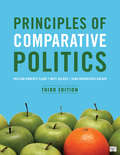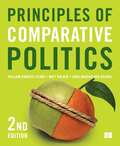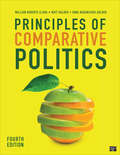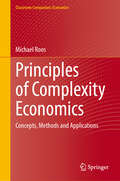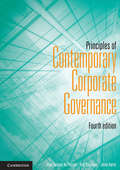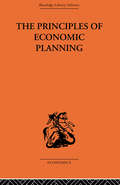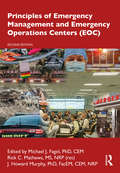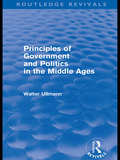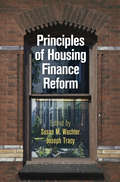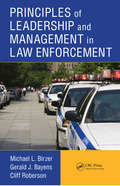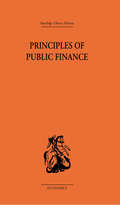- Table View
- List View
Principles of Communism
by Friedrich EngelsAn essential principle of Communism is to fight for civil rights.
Principles of Comparative Politics
by Dr William Roberts Clark Matthew R. Golder Sona N. GolderWilliam Roberts Clark, Matt Golder, and Sona Nadenichek Golder’s groundbreaking Principles of Comparative Politics offers the most comprehensive and up-to-date introduction to comparative inquiry, research, and scholarship. In this thoroughly revised Third Edition, readers have an even better guide to cross-national comparison and why it matters. Readers are offered a new intuitive take on statistical analyses and a clearer explanation of how to interpret regression results; a thoroughly-revised chapter on culture and democracy that now includes a more extensive discussion of cultural modernization theory and a new overview of survey methods for addressing sensitive topics; and a revised chapter on dictatorships that incorporates a principal-agent framework for understanding authoritarian institutions. Examples from the gender and politics literature have been incorporated into various chapters and empirical examples and data on various types of institutions have been updated. The book's outstanding pedagogy includes more than 250 tables and figures, numerous photos and maps, end of chapter exercises and problem sets, and a broader set of works cited. New to this Edition A new intuitive take on statistical analyses and a clearer explanation of how to interpret regression results are included. A thoroughly-revised chapter on culture and democracy includes a more extensive discussion of cultural modernization theory and a new overview of survey methods for addressing sensitive topics. A revised chapter on dictatorships incorporates a principal-agent framework for understanding authoritarian institutions. Examples from the gender and politics literature have been incorporated into various chapters. Empirical examples and data on various types of institutions have been updated. Online videos and tutorials guide students through some of the methodological components addressed in the book.
Principles of Comparative Politics
by Dr William Roberts Clark Matthew R. Golder Sona N. GolderWilliam Roberts Clark, Matt Golder, and Sona Nadenichek Golder’s groundbreaking Principles of Comparative Politics offers the most comprehensive and up-to-date introduction to comparative inquiry, research, and scholarship. In this thoroughly revised Third Edition, readers have an even better guide to cross-national comparison and why it matters. Readers are offered a new intuitive take on statistical analyses and a clearer explanation of how to interpret regression results; a thoroughly-revised chapter on culture and democracy that now includes a more extensive discussion of cultural modernization theory and a new overview of survey methods for addressing sensitive topics; and a revised chapter on dictatorships that incorporates a principal-agent framework for understanding authoritarian institutions. Examples from the gender and politics literature have been incorporated into various chapters and empirical examples and data on various types of institutions have been updated. The book's outstanding pedagogy includes more than 250 tables and figures, numerous photos and maps, end of chapter exercises and problem sets, and a broader set of works cited. New to this Edition A new intuitive take on statistical analyses and a clearer explanation of how to interpret regression results are included. A thoroughly-revised chapter on culture and democracy includes a more extensive discussion of cultural modernization theory and a new overview of survey methods for addressing sensitive topics. A revised chapter on dictatorships incorporates a principal-agent framework for understanding authoritarian institutions. Examples from the gender and politics literature have been incorporated into various chapters. Empirical examples and data on various types of institutions have been updated. Online videos and tutorials guide students through some of the methodological components addressed in the book.
Principles of Comparative Politics
by William Roberts Clark Matt Golder Sona Nadenichek GolderThe groundbreaking first edition of Principles of Comparative Politics offered the most comprehensive and up-to-date view of the rich world of comparative inquiry, research, and scholarship. Now, this thoroughly revised second edition offers students an even better guide to cross-national comparison and why it matters. The new edition retains its focus on the enduring questions with which scholars grapple, the issues about which consensus has started to emerge, and the tools comparativists use to get at the complex problems in the field.
Principles of Comparative Politics
by William Roberts Clark Matt Golder Sona N. GolderPrinciples of Comparative Politics offers a view into the rich world of comparative inquiry, research, and scholarship. This groundbreaking text gives students meaningful insight into how cross-national comparison is actually conducted and why it matters. William R. Clark, Matt Golder, and Sona N. Golder walk us through the enduring questions that scholars grapple with, the issues about which consensus has started to emerge, and the tools comparativists use to analyze the complex and interesting problems at the heart of the field. The thoroughly revised Fourth Edition includes streamlined discussion and analysis of key topics and theories in the field. Included with this title: LMS Cartridge: Import this title′s instructor resources into your school′s learning management system (LMS) and save time. Don′t use an LMS? You can still access all of the same online resources for this title via the password-protected Instructor Resource Site. Select the Resources tab on this page to learn more.
Principles of Comparative Politics
by William Roberts Clark Matt Golder Sona N. GolderPrinciples of Comparative Politics offers a view into the rich world of comparative inquiry, research, and scholarship. This groundbreaking text gives students meaningful insight into how cross-national comparison is actually conducted and why it matters. William R. Clark, Matt Golder, and Sona N. Golder walk us through the enduring questions that scholars grapple with, the issues about which consensus has started to emerge, and the tools comparativists use to analyze the complex and interesting problems at the heart of the field. The thoroughly revised Fourth Edition includes streamlined discussion and analysis of key topics and theories in the field. Included with this title: LMS Cartridge: Import this title′s instructor resources into your school′s learning management system (LMS) and save time. Don′t use an LMS? You can still access all of the same online resources for this title via the password-protected Instructor Resource Site. Select the Resources tab on this page to learn more.
Principles of Complexity Economics: Concepts, Methods and Applications (Classroom Companion: Economics)
by Michael RoosThis textbook serves as an introduction to the rising field of complexity economics. In thirteen chapters, it provides a comprehensive and systematic overview of the concepts and methods of complexity economics and their applications to economic issues. The book explains that the complexity approach is not just another method, but a worldview that is different from the one of academics with neoclassical training. By contrasting complexity economics with neoclassical economics, the readers are induced to reflect on their own unconscious beliefs about the economic world and develop their own approach to dealing with the pervasive complexities and uncertainties of reality. The first five chapters serve as an introduction and overview. Chapters 6 - 12 present the core concepts of the book. Each of the seven chapters introduces a key concept of complexity and provides applications to economics topics. The final chapter discusses the implications of complexity thinking for economic policy and for the future development of economics.This textbook addresses advanced undergraduate students and graduate students of economics, interested in a better understanding of the concepts and the way of thinking in complexity economics, as well as in acquiring a sound technical foundation to understand most of the research literature.
Principles of Contemporary Corporate Governance (4th Edition)
by Jean Jacques du Plessis Anil Hargovan Jason HarrisNow in its fourth edition, Principles of Contemporary Corporate Governance offers comprehensive coverage of the key topics and emerging themes in private sector corporate governance. It explains both the principles of corporate governance systems and their real-world application in an authoritative and engaging manner. This fully revised and updated text has four parts: basic concepts, board structures and company officers; corporate governance in Australia; corporate governance in international and global contexts; and shareholder activism and business ethics. The coverage of international contexts, written by specialists, includes sections on the US, the UK, Canada, South Africa, the EU, the OECD, Germany, Japan, China and Indonesia, plus new sections on New Zealand and India. A new chapter on business ethics and corporate governance presents contemporary discussions on the topic and explores some of the broader legal issues. Principles of Contemporary Corporate Governance is an indispensable resource for business and law students studying corporate governance, and also for academic researchers and practitioners wanting a deeper understanding of its underlying principles.
Principles of Ecological Landscape Design
by Travis BeckToday, there is a growing demand for designed landscapes--from public parks to backyards--to be not only beautiful and functional, but also sustainable. With Principles of Ecological Landscape Design, Travis Beck gives professionals and students the first book to translate the science of ecology into design practice. This groundbreaking work explains key ecological concepts and their application to the design and management of sustainable landscapes. It covers topics from biogeography and plant selection to global change. Beck draws on real world cases where professionals have put ecological principles to use in the built landscape. For constructed landscapes to perform as we need them to, we must get their underlying ecology right. Principles of Ecological Landscape Design provides the tools to do just that.
Principles of Economic Planning: A Study Prepared For The Fabian Society (Unwin University Book Ser. #Vol. 11)
by W. Arthur LewisDiscussing the problems arising from a mixed economy, Principles of Economic Planning argues for a system of controls that combine and encourage the best features of laissez faire and state planning. Chapters covering the following are included:* Money* Investment* Foreign Trade* Mobility* The Social Control of Business* NationalizationAppendices on economic union and planning in developing countries are also included.
Principles of Emergency Management and Emergency Operations Centers (EOC)
by Michael J. Fagel Rick C. Mathews J. Howard MurphyEmergency operations centers (EOCs) are a key component of coordination efforts during incident planning as well as reaction to natural and human-made events. Managers and their staff coordinate incoming information from the field, and the public, to support pre-planned events and field operations as they occur. This book looks at the function and role of EOCs and their organizations. The highly anticipated second edition of Principles of Emergency Management and Emergency Operations Centers (EOC) provides an updated understanding of the coordination, operation of EOCs at local, regional, state, and federal operations. Contributions from leading experts provide contemporary knowledge and best practice learned through lived experience. The chapters collectively act as a vital training guide, at both a theoretical and practical level, providing detailed guidance on handling each phase and type of emergency. Readers will emerge with a blueprint of how to create effective training and exercise programs, and thereby develop the skills required for successful emergency management. Along with thoroughly updated and expanded chapters from the first edition, this second edition contains new chapters on: The past and future of emergency management, detailing the evolution of emergency management at the federal level, and potential future paths. Communicating with the public and media, including establishing relations with, and navigating, the media, and the benefits this can provide if successfully managed. In-crisis communications. Leadership and decision-making during disaster events. Facilitating and managing interagency collaboration, including analysis of joint communications, and effective resource management and deployment when working with multiple agencies. Developing and deploying key skills of management, communication, mental resilience. Planning for terrorism and responding to complex coordinated terrorist attacks. Developing exercises and after-action reports (AARs) for emergency management.
Principles of Government Contracts
by Steven FeldmanA continuation of the successful Government Contracts in a Nutshell, 6th, this expanded Principles of Government Contracts, 7th summarizes the Federal Acquisition Regulation System (FARS), improper business practices and personal conflicts of interest, publicizing contract actions, and competition requirements. Addresses acquisition planning, contractor qualifications, and descriptions of agency needs. Explains socio-economic policies, commercial items, contract types, options, sealed bidding, and contracting by negotiation. <p><p>Reviews intellectual property, cost accounting standards, cost principles, financing, protests, disputes, and appeals. Explores research and development contracting, construction and architect-engineer contracts, inspection and warranty, value engineering, delays, suspension of work, changes and equitable adjustments, subcontracting, and government contract terminations for default and convenience.
Principles of Government and Politics in the Middle Ages (Routledge Revivals: Walter Ullmann on Medieval Political Theory)
by Walter UllmannIn many respects this book, first published in 1961, marked a somewhat radical departure from contemporary historical writings. It is neither a constitutional nor a political history, but a historical definition and explanation of the main features which characterised the three kinds of government which can be discerned in the Middle Ages – government by the Pope, the King, the People. The author’s enviable knowledge of the sources – clerical, secular, legal, constitutional, liturgical, literary – as well as of modern literature enables him to demonstrate the principles upon which the papal government, the royal government, and the government of the people rested. He shows how the traditional theocratic forms of government came to be supplanted by forms of government based on the will of the people. Although concerned with the Middle Ages, the book also contains much that is of topical interest to the discerning student of modern institutions. Medieval history is made understandable to modern man by modern methods.
Principles of Housing Finance Reform
by Susan M. Wachter Joseph TracyIn the fall of 2008, the world watched in horror as the U.S. housing finance system shattered, triggering a global financial panic and ultimately the Great Recession. Now, nearly a decade later, the long and slow housing recovery has reached a critical moment. Though the housing finance system has stabilized, it remains in the hands of the federal government, leaving taxpayers exposed to the credit risk while private funding remains mostly on the sidelines.Principles of Housing Finance Reform identifies the changes necessary to modernize the housing finance system, identifying guiding principles that should underlie a rebuilt system. Contributors to the volume set out a wealth of innovative solutions that are possible within this framework, presenting proposals for long-term structural reforms that would infuse new life into the U.S. housing finance system while enhancing long-term stability.Nearly a decade after the inception of the Great Recession, reform proposals have arisen across the political spectrum. This is a moment of opportunity for rebuilding a key sector of the U.S. economy. The research in this volume represents the best thinking of policy researchers and economic experts on the challenges that lie ahead and provides a roadmap for reforms to create a system characterized by liquidity, stability, access, and sustainability.Contributors: W. Scott Frame, Meghan Grant, John Griffith, Diana Hancock, Stephanie Heller, Akash Kanojia, Patricia C. Mosser, Kevin A. Park, Wayne Passmore, Roberto G. Quercia, David Scharfstein, Phillip Swagel, Joseph Tracy, Susan M. Wachter, Dale A. Whitman, Mark A. Willis, Joshua Wright.
Principles of Institutional and Evolutionary Political Economy: Applied to Current World Problems (Springer Texts in Business and Economics)
by Phillip Anthony O’HaraThis is the very first book to explicitly both detail the core general principles of institutional and evolutionary political economy and also apply the principles to current world problems such as the coronavirus crisis, climate change, corruption, AI-Robotics, policy-governance, money and financial instability, terrorism, AIDS-HIV and the nurturance gap. No other book has ever detailed explicitly such core principles and concepts nor ever applied them explicitly to numerous current major problems. The core general principles and concepts in this book, which are outlined and detailed include historical specificity & evolution; hegemony & uneven development; circular & cumulative causation; heterogeneous groups & agents; contradiction & creative destruction; uncertainty; innovation; and policy & governance. This book details the nature of how these principles and concepts can be used to explain current critical issues and problems throughout the world. This book includes updated chapters that have won two journal research Article of the Year Awards on climate change (one from the European Association for Evolutionary Political Economy, EAEPE); as well as a Presidential address to the Association for Evolutionary Economics (AFEE) on corruption. The structure of the book starts with two chapters on the principles of institutional and evolutionary political economy: firstly their history, and secondly a chapter on the contemporary nature of the principles and concepts. This is followed by nine chapters applying some of the core principles to current world problems such as the coronacrisis, climate change, corruption, AI-robotics, policy, money & financial instability, terrorism, HIV-AIDS and the nurturance gap. The book finishes with a conclusion, a glossary of major terms and an index. The author’s principles are well established in the literature and this book provides a detailed exposition of them and their application.
Principles of International Politics
by Bruce Bueno de MesquitaBruce Bueno de Mesquita, who set the standard for the scientific approach to international relations, has returned with a reformulated fifth edition of Principles of International Politics, based on extensive reviewer feedback and newly guided by an emphasis on questions about the causes and consequences of war, peace, and world order. More than ever, the strategic perspective in international relations is examined with complete clarity, precision, and accessibility. What hasn't changed is Principles' coverage of the fundamentals of IR. The foundational topics are given sustained treatment: the major theories of war, the domestic sources of international politics, the democratic peace, the problems of terrorism, the role of foreign aid, democratization, international political economy, globalization, international organizations and law, human rights, and the global environment. No other introductory text delivers such an easily-understood contemporary explanation of international politics, while truly enabling students to learn to mobilize the key concepts and models.
Principles of Leadership and Management in Law Enforcement
by Cliff Roberson Michael L. Birzer Gerald J. BayensEffective police organizations are run with sound leadership and management strategies that take into account the myriad of challenges that confront today‘s law enforcement professionals. Principles of Leadership and Management in Law Enforcement is a comprehensive and accessible textbook exploring critical issues of leadership within police agenci
Principles of Planology: Grondslagen der planologie (Studies in International Planning History)
by JM de CasseresBetween the World Wars the talent of Dutch town planner J.M. de Casseres (1902-1990) found expression in two visionary books and a clutch of influential articles. In an in-depth article published in February 1929 in the magazine De Gids under the title 'Grondslagen der planologie' (Principles of Planology) he invented a term for the new social-scientific discipline that would eventually enter the Dutch language. De Casseres made it his life's work to elevate the art and craft of town planning to academic status, classifying the international planning body of knowledge and making it accessible and applicable. The results of this internationally supported body of knowledge are reflected not only in de Casseres's publications but also in a string of urban design proposals for towns across the Netherlands. This republication of the De Gids article alongside five other influential de Casseres articles in translation and their original Dutch language form brings this key thinker into reach for a wider research audience.
Principles of Politics
by Joe OppenheimerModern rational choice and social justice theories allow scholars to develop new understandings of the foundations and general patterns of politics and political behavior. In this book, Joe Oppenheimer enumerates and justifies the empirical and moral generalizations commonly derived from these theories. In developing these arguments, Oppenheimer gives students a foundational basis of both formal theory and theories of social justice, and their related experimental literatures. He uses empirical findings to evaluate the validity of the claims. This basic survey of the findings of public choice theory for political scientists covers the problems of collective action, institutional structures, citizen well-being and social welfare, regime change and political leadership. Principles of Politics highlights what is universal to all of politics and examines both the empirical problems of political behavior and the normative conundrums of social justice.
Principles of Public Finance (Routledge Library Editions)
by Hugh Dalton'Dalton has succeeded in expressing general economic concepts in simple language' The Economist. The 1971 edition of this famous textbook includes recent material to the general survey on the theory of taxation, other forms of public revenue, public expenditure and public debts. There are chapters on modern theories of budgetary policy and the controversial cheap money policy, pursued by the author when he was in charge of the British Treasury from 1945-1947.
Principles of Security and Crime Prevention
by Clifford W. Van Meter Truett A. Ricks Pamela A. CollinsThis introductory text provides a thorough overview of the private security system. This edition includes crime prevention and its zones of protection - the theoretical framework that provides the bridge between private and public sector law enforcement. From the historical development and the professional nature of security and crime prevention to the legal aspects of private security, this well-rounded text covers basic elements of security and crime prevention.
Principles of Social Justice
by David MillerSocial justice has been the animating ideal of democratic governments throughout the twentieth century. Even those who oppose it recognize its potency. Yet the meaning of social justice remains obscure, and existing theories put forward by political philosophers to explain it have failed to capture the way people in general think about issues of social justice. This book develops a new theory. David Miller argues that principles of justice must be understood contextually, with each principle finding its natural home in a different form of human association. Because modern societies are complex, the theory of justice must be complex, too. The three primary components in Miller's scheme are the principles of desert, need, and equality. The book uses empirical research to demonstrate the central role played by these principles in popular conceptions of justice. It then offers a close analysis of each concept, defending principles of desert and need against a range of critical attacks, and exploring instances when justice requires equal distribution and when it does not. Finally, it argues that social justice understood in this way remains a viable political ideal even in a world characterized by economic globalization and political multiculturalism. Accessibly written, and drawing upon the resources of both political philosophy and the social sciences, this book will appeal to readers with interest in public policy as well as to students of politics, philosophy, and sociology.
Principles of Transversality in Globalization and Education
by David R. Cole Joff P.N. BradleyThis unique book comprehensively covers the evolving field of transversality, globalization and education, and presents creative, research-based thought experiments that seek to unravel the forces of globalization impacting education. Pursuing various approaches to and uses of transversality, with a focus on the ideas of Félix Guattari, it is the only book of its kind. Specifically, it examines the influence of Guattari at the forefront of educational research that addresses, enhances and sets free activist micro-perspectives, which can counter macro-global movements, such as capitalism and climate change. This book is a global education research text that includes perspectives from four continents, providing a balanced and significant work on globalization in education.
Principles of Urban Retail Planning and Development
by Robert J. Gibbs"...Extraordinary: Gibbs has popped the hood and taken apart the engine of commercial design and development, showing us each individual part and explaining fit, form and function."--Yaromir Steiner, Founder, Chief Executive Officer, Steiner + Associates"...the most comprehensive and expansive book ever written on the subject of Retail Real Estate Development. Gibbs is by far the most prominent advocate for reforming retail planning and development in order to return American cities to economic and physical prominence."-Stefanos Polyzoides, Moule & Polyzoides Architects & UrbanistsThe retail environment has evolved rapidly in the past few decades, with the retailing industry and its placement and design of "brick-and-mortar" locations changing with evolving demographics, shopping behavior, transportation options and a desire in recent years for more unique shopping environments.Written by a leading expert, this is a guide to planning for retail development for urban planners, urban designers and architects. It includes an overview of history of retail design, a look at retail and merchandising trends, and principles for current retail developments.Principles of Urban Retail Planning and Development will:Provide insight and techniques necessary for historic downtowns and new urban communities to compete with modern suburban shopping centers. Promote sustainable community building and development by making it more profitable for the shopping center industry to invest in historic cities or to develop walkable urban communities. Includes case studies of recent good examples of retail development
Principles of international politics: people's power, preferences, and perceptions (2nd edition)
by Bruce Bueno de MesquitaInternational relations through the ages

